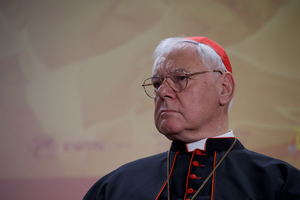Farewell Pontifical Commission ‘Ecclesia Dei’?
The Vatican body aimed at keeping traditional Catholics united with the Successor of Peter looks likely to be suppressed, but sources suggest it could actually be a positive development.

Pope Francis is expected to issue a papal decree in the coming weeks that will effectively dissolve the pontifical commission charged with bringing separated traditionalist Catholics back into full communion.
Various reliable sources have confirmed to the Register that the Pontifical Commission ‘Ecclesia Dei’ is to be abolished and its work absorbed into the Congregation for the Doctrine of the Faith, of which the commission is already a part.
The Pope’s “motu proprio” authorizing the change is allegedly still in its drafting stages, but is expected to be published in January. Others say it has already been written and signed.
Although some have voiced concern about the move, first made public in the Italian blog Messa in Latino, sources within the Vatican and elsewhere sympathetic to the commission are more sanguine, telling the Register that the structural change could be positive and actually facilitate regularization of the breakaway Society of St. Pius X.
Archbishop Marcel Lefebvre founded the SSPX in 1970 in response to errors he believed had entered into the Church following the Second Vatican Council. Pope St. John Paul II set up the Pontifical Commission in 1988 in response to Archbishop Lefebvre’s decision that year to consecrate four bishops without papal permission, a schismatic decision according to the Vatican which led to Archbishop Lefebvre’s excommunication along with those of the four bishops. Benedict XVI lifted the four bishops' excommunications in 2009.
The commission’s role was primarily to care for Archbishop Lefebvre’s followers who wished to remain united with the successor of Peter, serving as the chief Vatican body in overseeing efforts to regularize the SSPX and bringing them back into full communion with Rome.
The commission has also had the task of regularizing canonical situations of other religious communities of a traditionalist nature, giving them a canonical form corresponding to their charism.
Added to this, the commission has had the responsibility of working with local bishops to facilitate Mass in the Extraordinary Form of the Roman Rite (according to the 1962 Missal) for those faithful who request it, especially after Pope Benedict XVI’s 2007 motu proprio Summorum Pontificum which fully liberalized celebration of the Traditional Latin Mass if a “stable group” of faithful asks for it.
But according to the French traditionalist website L’Homme Nouveau, the SSPX has viewed the Pontifical Commission as an obstacle to its negotiations with the Vatican and would prefer to deal directly with the prefect of the CDF, currently Cardinal Luis Ladaria Ferrer, rather than having to go through the current president of the Pontifical Commission ‘Ecclesia Dei’, Archbishop Guido Pozzo. After years of talks between Archbishop Pozzo and the Society, few if any achievements have been made, the article says.
The rumored restructuring may therefore serve to address these concerns which the newly elected superior general of the SSPX, Father Davide Pagliarini, discussed with Cardinal Ladaria at a Nov. 22 meeting at the Vatican.
In a statement issued after those talks, Father Pagliarini stressed that for the SSPX the “fundamental problem is actually doctrinal” which “remains absolutely essential,” and that similarly for the Holy See, no canonical status can be established for the Society “until after the signing of a doctrinal document.”
“This restructuring is more likely a concession to the SSPX who aren’t interested in dealing with a structure like Ecclesia Dei,” said an informed Church source, adding that “what is central at the moment is discussion of doctrine rather than practical aspects.”
Part of Curial Reform?
Another possible reason for the suppression of the Pontifical Commission could be to do with the reforms of the Roman Curia. A new apostolic constitution, Predicate Evangelium (Preach the Gospel), is expected to be published in the first of months of the new year, and much of it is about streamlining curial offices and making them more cost-efficient. At the moment, Ecclesia Dei has a separate budget, so ending the structure and having its staff absorbed into the CDF could help achieve that as part of the curia-wide restructuring.
It could also ensure that various aspects of the commission’s work related to liturgy and religious life are kept within the arguably more sympathetic confines of the CDF rather than delegated to the Congregation for Divine Worship and the Congregation for Institutes of Consecrated Life and Societies of Apostolic Life, where the interests of the SSPX and traditional Catholics in general are likely to receive a less favorable hearing among officials in both of those dicasteries (CDW prefect Cardinal Robert Sarah notwithstanding).
Much of the alarm about the rumored changes stems from recent reports of some opposition to Summorum Pontificum within the Italian bishops’ conference, and a general belief — yet to be concretely proven — that Pope Francis wishes to repeal it and is opposed to the SSPX. Francis, however, has previously made a number of conciliatory gestures toward the Society, most notably granting all of its priests faculties to hear valid confessions during and after the Jubilee Year of Mercy.
Benedict XVI was the first to integrate the commission into the CDF when in 2009 he made the Congregation’s prefect the ex officio head of Ecclesia Dei rather than a cardinal president, which was the case until then.
For all these reasons, the general approach among sources both within the Vatican and among traditional Catholics is to “keep calm” and to wait and see what the final motu proprio communicates.
















